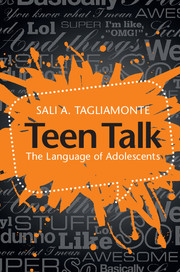Book contents
- Frontmatter
- Dedication
- Contents
- List of figures
- List of tables
- Preface
- 1 What's all the fuss about teen language?
- 2 Teens talking
- 3 Methods: how to tap teen language?
- 4 Quotatives: I'm like,“Oh my God!”
- 5 Intensifiers: upping the ante – super cool!
- 6 How do you start a sentence?
- 7 Sentence enders: finish with a flourish
- 8 Generics: stuffology
- 9 Just: just what?
- 10 Adjectives: the good, bad, and lovely
- 11 Other funky teenage features: You know what? I dunno. Whatever!
- 12 Internet language: everyone's online
- 13 Are they always going to talk like that?
- Notes
- References
- Author index
- Keyword index
12 - Internet language: everyone's online
Published online by Cambridge University Press: 05 June 2016
- Frontmatter
- Dedication
- Contents
- List of figures
- List of tables
- Preface
- 1 What's all the fuss about teen language?
- 2 Teens talking
- 3 Methods: how to tap teen language?
- 4 Quotatives: I'm like,“Oh my God!”
- 5 Intensifiers: upping the ante – super cool!
- 6 How do you start a sentence?
- 7 Sentence enders: finish with a flourish
- 8 Generics: stuffology
- 9 Just: just what?
- 10 Adjectives: the good, bad, and lovely
- 11 Other funky teenage features: You know what? I dunno. Whatever!
- 12 Internet language: everyone's online
- 13 Are they always going to talk like that?
- Notes
- References
- Author index
- Keyword index
Summary
Language is at the heart of the Internet.
(Crystal, 2006: 271)Many people who were born in the 1970s onwards grew up with the World Wide Web. Each generation thereafter has increasingly caught on to new means of communication, beginning with Instant Messaging, which was rapidly followed by Facebook, then Twitter, then Instagram, Tumblr, Pinterest, Snapchat, Tinder, and beyond. The generations of the 1980s and 1990s are digital natives.
Teen language and the Internet
Language is always being criticized in one way or another; however, teenage language in particular has come under intense condemnation in the last half of the twentieth century. Since the advent and expansion of the Internet there has been a veritable uproar of scorn. Thurlow (2006) presents a list of 101 popular news articles about the language of CMC and young people. The headlines surveyed suggest a threat to literacy, the destruction of language, and widespread use of abbreviations and truncated language. Teenagers are implicated in most of the articles which draw a direct correlation between Internet usage and bad grammar. Countless popular news sources suggest that the language of CMC and SMS and IM in particular is not only leading to grammatical ruin, but also impeding children's ability to write properly, as this oft-cited quote from the American Teachers’ Association suggests:
Text and instant messaging are negatively affecting students’ writing quality on a daily basis, as they bring their abbreviated language into the classroom. As a result of their electronic chatting, kids are making countless syntax, subject–verb agreement and spelling mistakes in writing assignments.
Kiesler et al. (1984: 1126) suggest that CMC is littered with examples of profane language – later termed “flaming” (Baron, 2003a: 21), a lack of standard salutations and structure, and reduced self-regulation. Davies (2005: 103–4) describes the language of text messages as follows:
writers of text messages quickly become adept at reducing every word to its minimum comprehensible length, usually omitting vowels wherever possible, as in Wknd for Weekend, Msg for Message, or deliberately using shorter misspellings such as Wot for What.
Not only is language reported to be adversely affected, so is sleep (“Text messaging is spoiling teenagers’ sleep”) (Dobson, 2003), intelligence (“Infomania worse than marijuana,” Daily Mail, 2005), and social skills (“Teen texting soars; will social skills suffer?” NPR News).
- Type
- Chapter
- Information
- Teen TalkThe Language of Adolescents, pp. 205 - 255Publisher: Cambridge University PressPrint publication year: 2016



